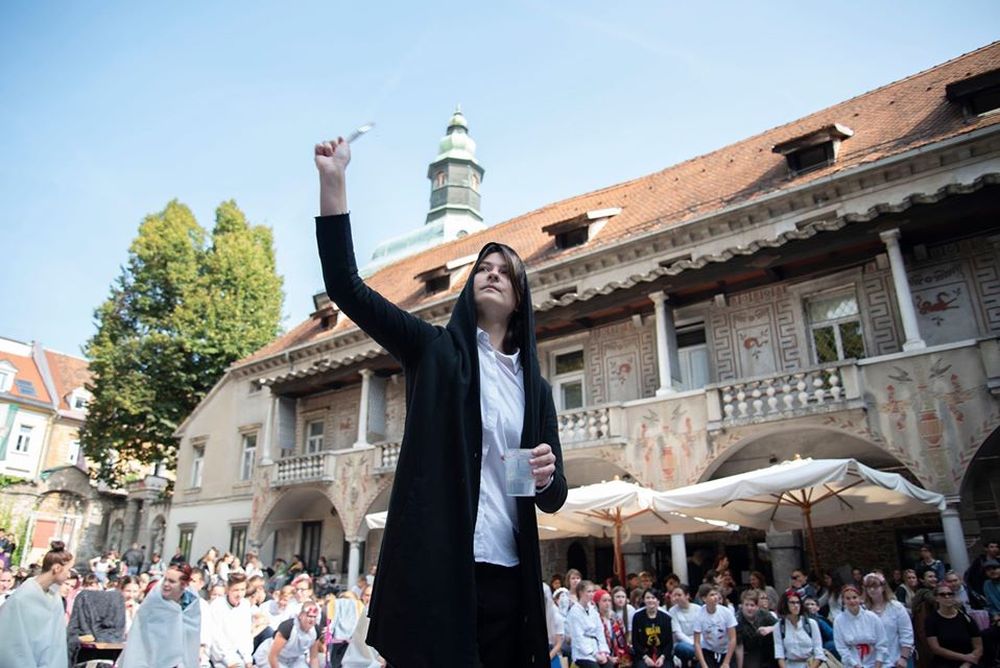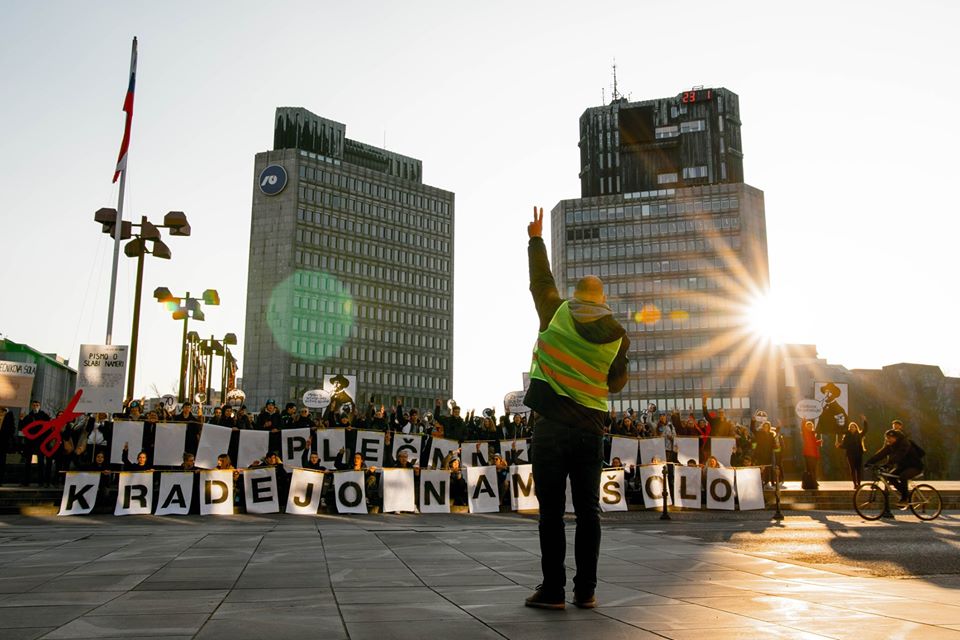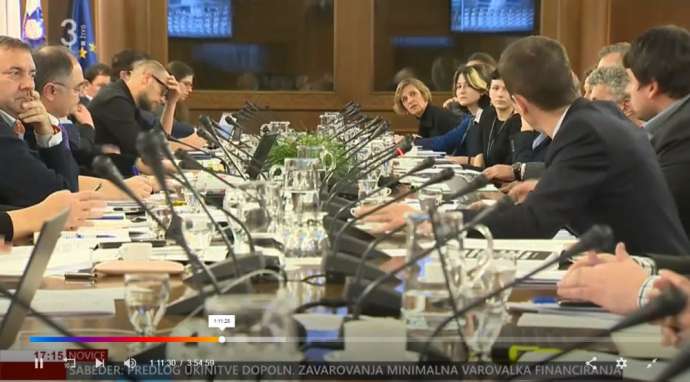The discussion last Thursday at two parliamentary boards – education and culture – on the future of the High School for Design and Photography in Križanke certainly qualifies for the list of recent government fiascos that eventually brought to Prime Minister Marjan Šarec resignation Monday morning (at least we hope these are the reasons).
For anyone, and that certainly is the majority of people, who didn’t manage to get through the four-hour-long session, which was televised and is currently available in the national broadcaster’s archive (available here), we list a few jaw-dropping exchanges in which the Ministry of Education’s highest officials (and the Mayor of Ljubljana) turned against the very people they were supposed to take care of, the teachers and students of a public school.
Threats, manipulations, gaslighting, and preaching about “cultured dialogue” was what the public servants of the highest order had to offer when facing concerned professors, students and members of the public, worried that a unique high school in Slovenia, the High School for Design and Photography (SŠOF), may soon be forced to leave the building it calls home.

The controversy begun when the school found out about a letter of intent the Ministry of Education signed with the City of Ljubljana in which it promised to swap its share of Križanke for some land where a new building for the school might someday stand, with August 31, 2022 stated as the conclusion of the deal. The school has resided in Križanke ever since the great architect Jože Plečnik redesigned the former monastery by opening it to the public physically and also by bringing the school inside, making Križanke one of the constitutive elements of the so called University-belt in Ljubljana.
The urgent session of the two boards was called by Levica, with MP Violeta Tomič as its speaker. For the first two hours of the session about 400 SŠOF students, their parents and other protesters gathered in front of Parliament in support of their representatives at the meeting.

The session was called by the left-wing Levica, although the right-wing SDS board member stated that their party was planning to do so as well. In short, Levica proposed to both boards that the letter of intent should be revoked and that the school remain inside the cultural monument.
Violeta Tomič concludes at 00:21:55, and according to the procedural rules the president of the parliamentary board for education, Branislav Rajić, is now supposed to give floor to the Minister of Culture, Zoran Poznič.
However, getting things off to a bad start at the very beginning, Ljubljana Mayor Zoran Janković interrupts with a request to speak first, since he doesn’t have time and needs to leave soon. The president allows him to speak “if nobody minds”, which triggers a protest from a board member, MP Zmago Jelinčič Plemeniti (Slovenian National Party).
At 00:22:00 a fierce exchange between Janković and Jelinčič ensues, in which Jelinčič insists that Janković waits for his turn and that the state should speak first. The argument, which includes mutual accusations about who of the two had to defend himself in front of the court most recently, comes to the point when Janković at 00:22:45 drops the formal polite form of addressing his interlocutor in Slovenian (from “you” in plural, to “you” in singular). The “debate” then proceeds as follows:
00:24:50 Janković: Naloga mestne občine je, da ščiti lastnino mestne občine v korist meščank meščanov. Zakaj imamo mi teh 48% [Križank], ne me spraševat, tako to piše, tako je not, jaz nisem delil. Vendar uporabljamo samo 25%. […] Ministrstvo se je obvezalo, da bo do 31. 8. 2022 šolo spraznilo, ker bo imela do takrat šola novo stavbo. Zdaj je nov terminski plan, jaz zdaj to povem, če bo to problem, ne bo nobenega problema podaljšat. Če to pade, tudi ok. Vam pa drugo povem. V kolikor to pade tudi ne vidim nobenega problema. Šola je protipotresno varna [sic], govorim o stavbi, Mi bomo s prvim septembrom letos zasedli svojih 48 procentov prostora in to je dejstvo. To kar je naše, bomo pač zasedli in bomo uporabljali v kulturne namene. […] Če bojo začel delat na novih prostorih, da se bo videlo operativno, potem bomo rok podaljšal. Ampak dokler se pa ne začne delat, […], bomo pa naredili to, kar je naše. Mi pač imamo in smo dolžni ščititi našo lastnino v dobro meščank in meščanov. Vi pa lahko sklepate kar hočete, razen, da ukinete mestno občino.
Jankovič then concludes and eventually, without being it his turn to speak, turns his microphone back on, “just a word, since I am leaving” (00:34:08), then he is finally subdued by the president, who ignores his attempts at speaking and proceeds with the session instead, allowing the Mayor to leave.
Following the Minister of Culture, who only gives a short statement, the floor is given to the Minister of Education, Science and Sport, Jernej Pikalo (00:35:27 – 00:48:00).
Pikalo says that there has been a variety of interpretations of the situation which are mostly untrue, so he will address them one by one, “stating facts only, without any emotional interludes”.
He then gives a lecture on contextual reading, and how people tend to misinterpret things when they don’t read the whole document. He then claims that the whole point of the document he holds in his hands, even without the context of the entirety of the remaining text, is hiding in its last paragraph, which he then proceeds to read.
The “document” is a PR message, published on the Ministry’s website, and the last paragraph begins with a statement, that “fears that SŠOF will be left without a roof over its head are therefore ungrounded”, because, in short, the school will soon get a new, better equipped building at a great location, while until then it will remain at its current site.
Despite the warning of a board member, Nina Mavrovič ( at 2:23:10), about the non-binding nature of a PR piece on the Ministry’s website and a binding nature of the letter of intent, which alongside Jankovič’s threat about taking over the premises, perhaps even at the end of this school year, raises a good reason for concern, Pikalo insists on his premise that belief in his promises is positively correlated with the listener’s intelligence, by repeating this same “fact” in his concluding statement as well:
3:40:36 Pikalo: Sedaj, kar se tiče vaših pozivov, jaz seveda mislim, da so dijaki visokih intelektualnih sposobnosti in glede na to, da sem že dvakrat povedal, bom samo še tretjič ponovil. Mislim, da so že prvič dvakrat razumeli. Nihče ne bo nikogar nikamor pošiljal, dokler nova lokacija na Roški ne bo izgrajena.
Pikalo then continues with a predicted timeline of the construction site, stating that it is in truth extremely tight, but if there is a will and, as he can see, the will exists in this Parliament, the goal is totally achievable.
Note that Pikalo was saying this last Thursday, while this Monday began with the resignation of the Finance Minister and then the Prime Minister himself, who cited the current structure of Parliament and the ruling coalition as the reason for stepping down.
After the ministers, guests were invited to enter the discussion with contributions of their own. Let us stop at one of the statements given by SŠOF professor Apolonija Simon, which prompted the Secretary General of the Ministry of Education, Mitja Blaganje, to reply with a textbook example of gaslighting.
In her speech, (which begins at 01:01:56), Apolonija Simon, describes a meeting with the Mayor, which to her surprise also involved presence of the officials from the Ministry:
1:02:45 Simon: Ko je prišla beseda tudi na to, kaj si želimo, to je bilo vprašanje župana meni, sem povedala, da si želimo nove prostore v bližini križank, kar bi nam omogočalo, da imamo lažje prehode, […], je gospod državni sekretar, gospod Blaganje rekel, da smo za take lokacije predragi. Moram reči, da sem osupnila nad tem odgovorom.
1:09:14 Blaganje: Gospo učiteljico oziroma profesorico na Srednji šoli za oblikovanje in fotografijo bi prosil za opravičilo, ker je javno navedla neresnico. Tega sestanka, ki ga je omenjala, smo se seveda udeležili na vabilo mestne občine Ljubljana in na tem sestanku nikdar nisem izrekel očitanih mi besed. Je pa ta sestanek zaznamoval verbalni spor med G. Brlekom [Festival Ljubljana] in G. Marklom [SŠOF], to je resnica in v eni fazi je ta sestanek potekal v zelo nekonstruktivnem ozračju. Za tovrstne navedbe pa prosim za opravičilo, ker je to zelo velika neresnica, da ne uporabim kakšne druge besede.
Simon is then allowed to take the floor, but only if she wishes to apologise
01:10:10 Simon: Jaz bi želela povedat, da je bila prisotna kar neka množica ljudi: ravnatelj, predsednik sveta, vsi smo slišali izrečene besede, polegeg tega je župam repliciral: Ne, kako predragi, zakaj bi bili predragi? […] Bilo pa je rečeno za lokacijo Rog, za Rogom je parcela, kjer je dalo ministrstvo za šolstvo izvesti preveritveni načrt, kjer bi se nas dalo vpeti noter in v kontekstu te parcele je bilo izrečeno, da je ta lokacija za nas predraga.
Mitja Blaganje then replies:
Hvala lepa za dodatno pojasnilo, vendarle v vaši prvotni izjavi ste trdili, da sem to izjavo izjavil v zvezi z delovanjem SŠOF na obstoječi lokaciji, seveda česa takega nisem izjavil, vljudno vas prosim, da ne trgate izjav iz konteksta, tudi mi smo imeli tukaj prisotne ljudi na tem sestanku in seveda tudi, to ni bilo nikoli izjavljeno.
A note on the background to this exchange: the school staff had previously met with various officials from the Ministry and at a certain point turned down another meeting with the Secretary General, demanding to see the Minister instead. The event, that is – turning down the meeting with the Secretary General. The Secretary General! – including the emphasis and repetition, is described by Pikalo (beginning at 00:43:40) as an example of poor communication etiquette on the side of the school.
Also, “professor” not “teacher” is the correct way to address a high school teacher with a certain level of education, which is the Secretary General of the Ministry of Education, Science and Sport’s job to know. It is not that Mr. Secretary General Mitja Blagajne, PhD, doesn’t care about such titles. The Secretary General did state his own title with great pride and did not call himself merely a public servant. Misstating the professor’s title was an expression of contempt, although as a gaslighter he would probably now claim he has always been respectful, and that whoever says otherwise should apologise to all the teachers they just said were not worth all the respect they deserve.
The exchange between the Secretary General and the professor quoted above was the only contribution the former made to the discussion and we cannot but remember the story about three of the Education Ministry’s PR people, who left their jobs in November last year. Minister Jernej Pikalo “has denied any hints that mobbing [in Slovenian the word often refers to workplace harassment in general] was the reason, and Mitja Blaganje explained that they have not been able to find a common language regarding the payment of additional work” wrote Siol.si at the time.
After Blaganja, it was time for another Secretary, just Secretary this time, Jernej Štromajer, to throw some of his wisdom at the disrespectful peasants who were sitting before him.
Štromajer opens with the following sentence:
1:22:37 Štromajer: Moram priznat, da sem iskreno razočaran nad tem izvajanjem. Ker ne morem verjet, da sedimo tule že uro in pol in sedaj smo poslušali nek vnaprej napisan traktat, brez da bi se poslušalo, kaj je bilo pred tem povedano.
As expected, he then continues to perform exactly what he tried to criticise in his attempt at disqualifying another professor from the school for reading his statement instead of, perhaps, changing his mind after the minister reiterated – why is there nobody listening? – that there is nothing for the teachers, students and others concerned about the school to worry about:
1:22:55 Štromajer: Zdaj, trditi, da je šola s tem pismom o nameri kakorkoli bila ogrožena je malo smelo rečeno. Ker cilj tega pisma o nameri je ravno nasproten. Namreč, da se problematično stanje, ki je trenutno na šoli, vendarle reši. Lejte, to da šola zaseda prostor, ki ni v njeni lasti, oziroma v njenem upravljanju in po domače rečeno skvota v 23% stavbe v Kiržankah v lasti drugega subjekta, čeprav je to mestna občina Ljubljana, se verjetno vsi strinjamo, da v neki pravni državi preprosto ni vzdržno. In zato je naše ministrstvo s pismom o nameri želelo razrešiti odprta vprašanja, ki so se dolga leta nabirala med MOL-om in državo in eno izmed teh je tudi, kot ste omenili, upravljanje določenih prostorov v Križankah. […] ampak minister vam je danes tukaj jasno povedal, mi je žal, da ne poslušate, da strah, da bi šola ostala brez strehe nad glavo, ne obstaja.
Štromajer is talking about the 23% that was given to the city government by the first instance court in 2007, after the City sued the Ministry for a larger share of Križanke. The Ministry of Education then didn’t bother to appeal, a fact stated in the debate on several occasions, as was the legality of the Minister’s promises, something Štromajer didn’t address. Perhaps he wasn’t listening? In either case, we are very disappointed by your performance, Mr. Štromajer.
At the end of the session, members of the boards voted against the proposals of Levica (with 8 votes in favour and 8 votes against its proposals) and supported the coalition’s conclusions for the Ministry to re-examine the possibility for the school to remain at its current location and report its findings back to the board in three months. Another decision adopted by the coalition members was to put a memorial plaque on a wall of Kiržanke along with a memorial room inside, in memory of a school that was once there.
Just a few days later, the Minister’s assurance that the school would not be pushed out of its current premises have been made obsolete by the fall of the coalition he was a part of, while the 2007 court decision on giving 23% of the school to the City of Ljubljana, the signed letter of intent and Mayor Janković’s threats to kick the school out in the street later this year remain as real as ever.
In conclusion, as Professor Apolonija Simon suggests in her statement (1:04:30), the “chronology of the event(s) in which Križanke was gradually getting lost, gives an impression that the Ministry wants to get rid of Križanke” and, if I may add, does not seem to be very concerned with what happens to the famed school that resides in it, or the students who are studying there.






